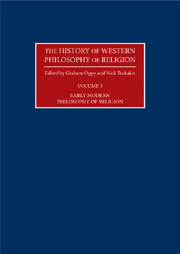Book contents
- Frontmatter
- Contents
- Editorial Introduction
- Contributors
- 1 Early Modern Philosophy of Religion: An Introduction
- 2 Niccolò Machiavelli
- 3 Martin Luther
- 4 John Calvin
- 5 Michel de Montaigne
- 6 Francisco Suárez
- 7 Thomas Hobbes
- 8 René Descartes
- 9 Ralph Cudworth
- 10 Blaise Pascal
- 11 Baruch Spinoza
- 12 John Locke
- 13 Gottfried Wilhelm Leibniz
- 14 George Berkeley
- 15 Voltaire
- 16 The Deists
- 17 Jonathan Edwards
- 18 Thomas Reid
- 19 David Hume
- 20 Denis Diderot
- 21 Immanuel Kant
- 22 Gotthold Ephraim Lessing
- 23 William Paley
- Chronology
- Bibliography
- Index
22 - Gotthold Ephraim Lessing
- Frontmatter
- Contents
- Editorial Introduction
- Contributors
- 1 Early Modern Philosophy of Religion: An Introduction
- 2 Niccolò Machiavelli
- 3 Martin Luther
- 4 John Calvin
- 5 Michel de Montaigne
- 6 Francisco Suárez
- 7 Thomas Hobbes
- 8 René Descartes
- 9 Ralph Cudworth
- 10 Blaise Pascal
- 11 Baruch Spinoza
- 12 John Locke
- 13 Gottfried Wilhelm Leibniz
- 14 George Berkeley
- 15 Voltaire
- 16 The Deists
- 17 Jonathan Edwards
- 18 Thomas Reid
- 19 David Hume
- 20 Denis Diderot
- 21 Immanuel Kant
- 22 Gotthold Ephraim Lessing
- 23 William Paley
- Chronology
- Bibliography
- Index
Summary
The thought of Gotthold Ephraim Lessing (1729–81) is characterized from the outset by a fearless and radical independence that led him to resist the lure and comfort of systems that claimed the prerogative of knowing the truth. He once wrote, with characteristic tongue in cheek, but at the same time pinpointing one of the essential features of his way of thinking, that if he was satisfied with what he had written he tore it up, but if he was not satisfied he put it into print, for his thinking was for his own enlightenment (Lessing 1886–1924: vol. 16, 293–4). This critical openness is the hallmark of his innovative approach to literary criticism, drama and aesthetics, which has rightly earned him a place as a seminal figure in German literary history, but throughout his life he was also deeply engaged with philosophical, theological and religious issues and his contribution in this sphere is no less significant.
His father was an orthodox and scholarly Lutheran pastor in Kamenz, Saxony, and his upbringing there, combined with his schooling in Saint Afra, Meissen, ensured that he had a thorough grounding in theology and church history. This marked the start of his lifelong interest in these disciplines, which in the last decade of his life, following his appointment in 1770 as librarian to the Duke of Brunswick-Lüneburg in Wolfenbüttel (a post formerly held by Leibniz), came to dominate his work. It was in this capacity that he became involved in very public controversy, provoked by his publication of fragments from the work of the radical deist Hermann Samuel Reimarus, a daring enterprise that sent shockwaves through the world of Protestant theology. Similarly, his provocative defence of the reviled Spinoza unleashed a debate that raged after his death and brought that philosopher’s significance for the Enlightenment into a new light.
- Type
- Chapter
- Information
- The History of Western Philosophy of Religion , pp. 289 - 302Publisher: Acumen PublishingPrint publication year: 2009

